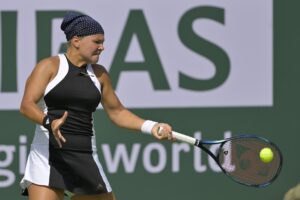After a dominant first round win at the US Open against Yoshihito Nishioka, Roger Federer joked in his on-court interview about his unbeaten record in first round matches saying that perhaps he should retire to protect his perfect 18-0 record. This tossed-off remark immediately set social media alight, as happens every time Federer says “retirement,” and lead to a flurry of speculations about whether the 2018 US Open could be Federer’s swan song. Federer was even asked about his retirement joke during his full post-match press conference and had to clarify that he was, in fact, just joking.
Federer Saying the Word ‘Retirement’ Should Not Be Exciting News
The firestorm of dashed-off commentary that accompanies every retirement-adjacent utterance Federer makes is tiresome and there are two reasons it should stop for now. The first, and most obvious, is that Federer himself has been clear that he does not plan to retire for several years to come. When asked about his decision to take six months off in 2016, he stated, “I took six months off to return for a few years.” Granted, “a few years” is not an exact measurement of time, but since it has been less than two full years since his return, and he is still playing well, it is unlikely that he has any plans to leave the game.
Federer is Likely to Play at Least One or Two More Years
Federer’s substantive statements on the subject of retirement have been that he will continue playing as long as 1) his body holds up 2) he is happy on the tour 3) he is in contention for big titles. Those are three easy criteria for assessing any hysteria accompanying a retirement rumor about Federer. In the instance of his latest mention of retirement, the assessment of these three elements is easy.
His body seems fine. Federer played below the level of which he is capable in Cincinnati, especially in the final against Novak Djokovic, but did not look physically hampered. He even scored excellent wins, such as his tight three set victory in the semifinals against Stan Wawrinka, that necessitated physical stamina and mental toughness. His first round match at the US Open was not much of a contest, but Federer also didn’t let it develop into one, playing solidly and looking untroubled by the heat and humidity.
He is clearly still enjoying himself on court. He is the most popular and best loved tennis star in the world with crowd support in every city to which he travels. Federer just signed a $300 million ten-year clothing deal and his wife and kids travel with him as often as ever. He appears relaxed in interviews and even discussed his level of general contentment in New York with ESPN the day after his first round victory.
Federer as slipped from being one of the favorites for the US Open because of his challenging draw and recent unconvincing form, however, he is still clearly in contention for the biggest titles on the ATP tour. He started the year with a grand slam win in Australia and backed it up by winning the ATP 500 in Rotterdam and reaching world number one. Of the eight tournaments he has played this year he only failed to make the finals at two: the Miami Open and Wimbledon. Though he has lost more finals in 2018 than during his dream run in 2017, he still has a grand slam title, two ATP 500 titles, and two Masters 1000 finals appearances to his name.
The Post-Federer Future is Still Bright
The second reason reaction to Federer’s mentions of retirement is overblown is that it seems predicated on the idea that the game of tennis cannot survive, or will be irreparably damaged by his departure.
I am a huge fan of Federer. I watched tennis occasionally for years, but it was only through Federer that I found a true love of the game. I don’t want to see him retire any time soon, however, the talented crop of younger players making their way up the ATP rankings indicate that the game is in good hands. Just this year, the meteoric rise of Stefanos Tsitsipas and the continued (if intermittent) successes of Denis Shapovalov show the one-handed-backhand will not disappear from the top of the game with Federer’s retirement. The rising talent Felix Auger-Aliassime, who powered through US Open qualifying only to retire from his first round match with heart problems, has a fluid all court game and is likely to enjoy great success in years to come.
It will be a sad day when Federer retires, and his unique synthesis of power and grace may not be contained fully in any one player of the next generation. For now, however, the eruption that accompanies Federer’s mere mentions of the word retirement is unwarranted and unnecessary both because he will play for at least another season and because there are many talented players who will take his place on the tour.






